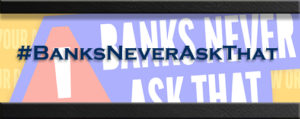October 1, 2021
 Can You Spot a Phishing Scam?
Every day, thousands of people fall victim to fraudulent emails, texts and calls from scammers pretending to be their bank. In fact, the Federal Trade Commission’s report on fraud estimates that American consumers lost a staggering $3.3 billion to these phishing schemes and other fraud in 2020—that’s nearly double what was lost in 2019.
At First United Bank, we think it’s time to put scammers in their place.
Online scams aren’t so scary when you know what to look for. As your financial partner and neighbor your safety and security are always top-of-mind for us, but we’re committed to helping YOU spot them as an extra layer of protection for your account and financial information. We’ve joined with the American Bankers Association in a nationwide effort to fight phishing—one scam at a time.
It starts with these four words: Banks Never Ask That. Because when you know what sounds suspicious, you’ll be less likely to be fooled.
These are the top three ways criminals are “phishing” for your information:
Can You Spot a Phishing Scam?
Every day, thousands of people fall victim to fraudulent emails, texts and calls from scammers pretending to be their bank. In fact, the Federal Trade Commission’s report on fraud estimates that American consumers lost a staggering $3.3 billion to these phishing schemes and other fraud in 2020—that’s nearly double what was lost in 2019.
At First United Bank, we think it’s time to put scammers in their place.
Online scams aren’t so scary when you know what to look for. As your financial partner and neighbor your safety and security are always top-of-mind for us, but we’re committed to helping YOU spot them as an extra layer of protection for your account and financial information. We’ve joined with the American Bankers Association in a nationwide effort to fight phishing—one scam at a time.
It starts with these four words: Banks Never Ask That. Because when you know what sounds suspicious, you’ll be less likely to be fooled.
These are the top three ways criminals are “phishing” for your information:
- Text Message: If you receive a text message from someone claiming to be your bank asking you to sign in, or offer up your personal information, it’s a scam. Banks never ask that.
- Email: Watch out for emails that ask you to click a suspicious link or provide personal information. The sender may claim to be someone from your bank, but it’s a scam. Banks never ask that.
- Phone Call: Would your bank ever call you to verify your account number. No! Banks never ask that. If you’re ever in doubt that the caller is legitimate, just hang up and call your bank directly at a number you trust.
